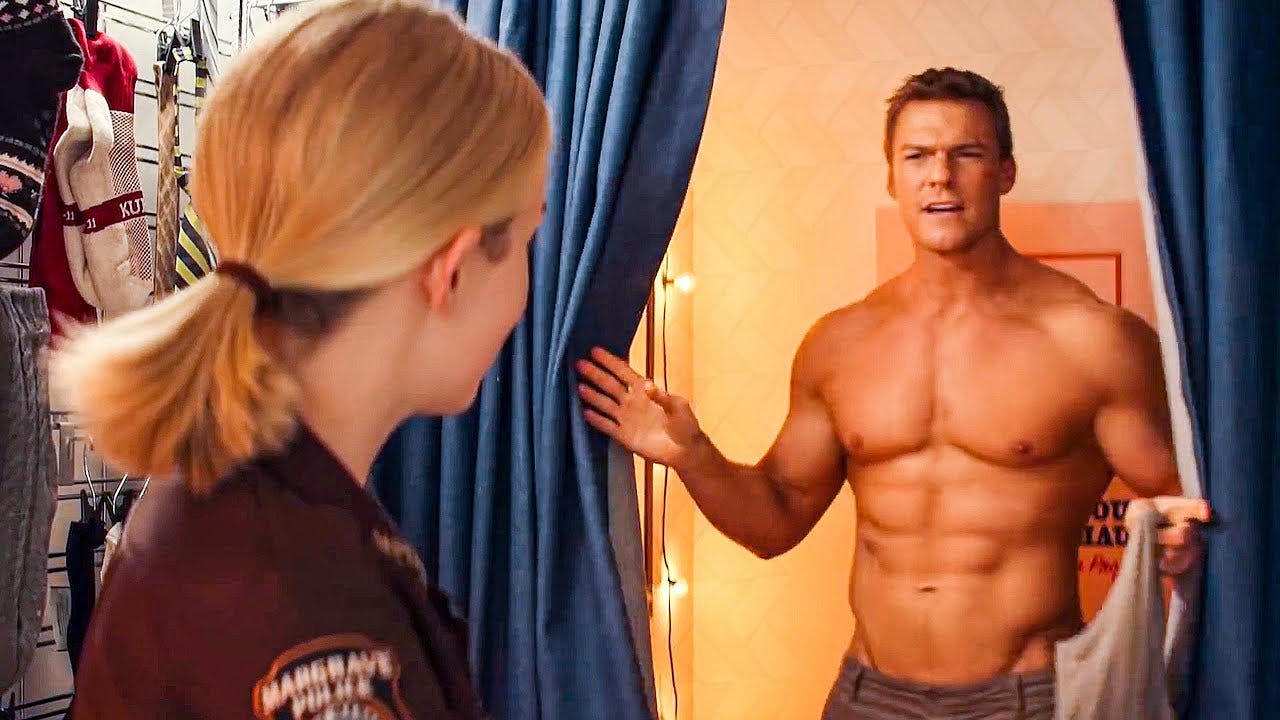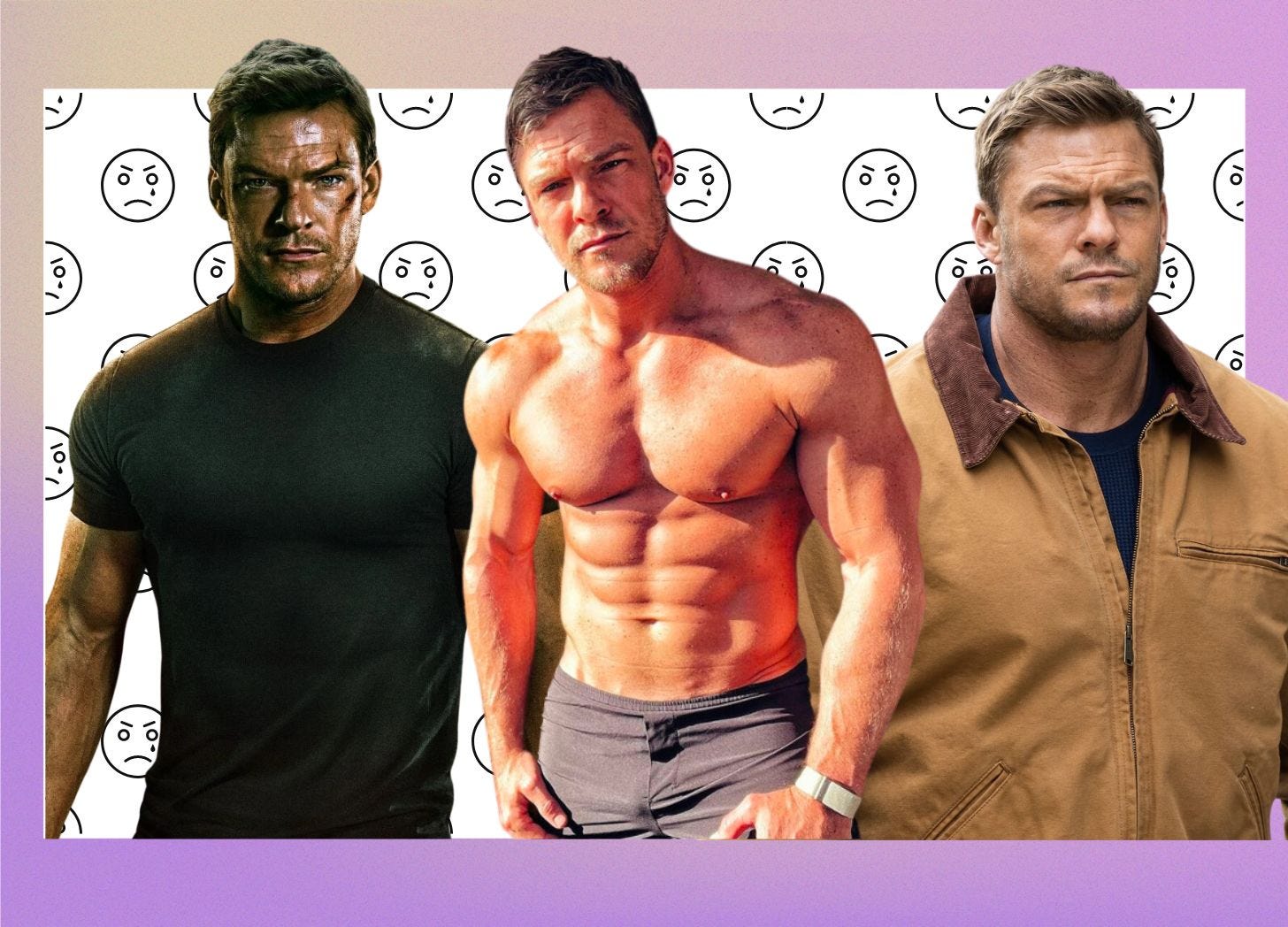The unbearable bigness and hugeness of Jack Reacher
the man is big and huge enough to never feel loneliness and that worries me
I have recently moved into a new apartment after a breakup, and I have to tell you that I do not recommend the experience. Just in case you were considering uprooting your life in the most unpleasant way: Don’t! Stop!
I am leaving “getting dumped, losing your job, and having no house all in the same week” a very negative review on Yelp. I do not recommend. I’ve moved a lot in my life, because I lived in the Sydney rental market with rescue dogs for a long time. Once I moved four times in a year. It always sucks more than you can imagine, but even I was surprised by how badly I have emotionally dealt with this current situation - I’m still physically very unwell purely from the stress and horror of the whole thing.
I’m a relatively together kinda guy, not prone to big emotions - in fact, according to another person I used to date, sometimes intimidatingly goal oriented - so it was confronting to feel so completely out of control and… broken by a big life change, beyond the heartbreak. I found myself thinking wistfully of becoming the kind of man who could take this all in his stride, who could shrug off the sudden loneliness and anxiety and lack of confidence. A man who didn’t need to move seventeen boxes of snazzy pants to different apartments around Australia. A man so big and so huge that heartbreak can’t touch him.
I was thinking of Jack Reacher.
In any given episode of Reacher, the titular Jack Reacher will walk into a location and everyone will see him and comment on him. He’s the prequel to that elephant in the room that everybody notices.
This is because he is a huge dude, just a massive slab of guy, a thick cut of man meat. “Geez, I’ve seen skyscrapers with less floors than this guy” some goon will say, because the dialogue is pretty bad in this show. Then that goon will try to kill Reacher, which is ridiculous because he is the size of a truck. Every second we are reminded that this man is the closest thing we’ll ever see to The Hulk, like how in the first episode he nonchalantly snaps the cable ties binding his wrists, because “cuffs didn’t fit him”. This man has such muscular wrists that handcuffs do not fit around them?
The promo for season 2 was a photo of him facing away from the camera, with the slogan “Reacher’s Back” emblazoned across his broad and muscular back. Get it? He’s a unit.
It’s also his primary reference point to himself - “tall guys never get enough leg room” he’ll quip, before booting a crooked cop off a building or whatever.
I’m just annoyed that they haven’t gone for a “they call him Reacher because he’s always tall enough to REACH cups in the cupboard” style joke, it’s in the name people!
If you’re not across the rich and storied world of Jack Reacher, the show is an Amazon Prime series with a confirmed third season coming, that stars Alan Ritchson as a big, big guy. In the Lee Child books that the series is based on, Jack Reacher is 6’4 or maybe 6’5, but more importantly thick. I’m 6’2, but I’m built like one of those wavy armed balloon men out the front of car dealerships. The books are equally as impressed with his biggitude - which makes the 2012 film’s casting choice of famously excited little man Tom Cruise even the more baffling.
Reacher is an ex military special forces investigator type person, and the show revolves around things from his past rearing their ugly head and forcing him to leave his nomadic lifestyle and punch and kick and shoot baddies. It makes sense in the moment, but I’m left with a pleasant vagueness when I try to remember the overall plot of the show. He’s too big for much plot to fit in around him.
Apart from the advantages that his hugeness gives him in headbutting generic bikie gang members, and the distraction it gives the audience from the stilted dialogue, I spent much of the show trying to work out why Jack Reacher was so big?
Was it the joy of the carnival freakshow alone? Or is it because Jack Reacher is the manifestation of a long forgotten masculine archetype - the man too big for feelings.
The smooth waxed chest of stoicism
The other major character trait that Jack Reacher possesses apart from gigantism is that he’s a lonely wandering minimalist.
For some reason, he’s created for himself a life entirely off the grid, unburdened by belongings or connections. He buys a single cheap outfit from op shops, and only carries a toothbrush with him. Yet somehow he always has a perfectly waxed chest, which posits the theory that he actually organises his nomad wandering entirely around available waxing parlours.
He drifts from town to town, an ultra-violent Paul Bunyan, listening to Blues music and accidentally solving military crimes. His few remaining friends, who somehow tolerate being pals with someone with no conceivable way of being contacted, just accept this lifestyle as part of his personality, a quirk. At one point they contact him by putting a suspicious amount of money into his bank account.
When I first started watching this show, it read more as a cry for help to me, an avoidant strategy probably based off some kind of PTSD from war and whatnot. This is a man who merely grimaced when he found out his brother had been murdered, and got to work getting justice-based revenge on the killers.
But now, weighed down by the dreadful weight of my awful belongings and wanting nothing more than to flee my problems and the unbearable weight of sudden loneliness, I began to see Jack Reacher as more of an aspirational figure for men. Someone so big and huge they can endure feelings, so stoic that they would never go crunning (cry running).
There’s something archaic about the Jack Reacher archetype, a throwback to an old idea of what it means to be a man, that almost makes him feel anachronous, in the wrong world. When you realise that he’s modelled off that old film hardboiled kind of figure, whose primary trait is an inability to give up, and who can take a beating, then you begin to realise that Reacher and his bigness and hugeness is not just a random character choice but a manifestation of a kind of ethical perspective. He might be anachronous, even slightly ridiculed, but that’s because he hearkens back to what’s seen as a kind of atavistic model of masculinity, a simpler and stronger time where men were men and they were just so massive and emotionless. He is the physical manifestation of what we would consider (toxic) male stoicism.
You only need to look at the current conservative, alt-right obsession with things like ancient greek statues, tradwives, and oddly, Sydney Sweeney’s massive honkers, to realise there is a weird yearning for a non-existent bygone era where everything was apparently simpler (more outwardly racist). It’s a projection born from feeling uncomfortable with progression - or more specifically, uncomfortable when straightness, whiteness, and maleness is not automatically top of the pile. I believe Jack Reacher is part of this.
In fact, the male action star has often delved into this aspirational male stoicism - your John Wicks and Jason Bournes and even James Bonds. People who have seemingly traded emotions for joyless efficiency at shooting guns and solving mysteries. Sure, they’re allowed to have a motivating tragedy - dead wife, dead other wife, dead girlfriend, etc - but they’re not allowed to ENGAGE with that emotion. They must take action instead.
It’s why I love Die Hard so much - John McClane is the opposite of stoic (although his communication style is pretty grim). Instead, he spends each of his action-packed movies griping and groaning like a suburban dad who just trod on lego, just really peeved about all these terrorists, visibly annoyed by his faltering relationship. He’s also not joylessly efficient - he’s a scrapper, using wits and tenacity to win, rather than flawless aim and grim aptitude. He’s a different kind of male archetype, equally reductive in many ways - but at least his strength is not based on a lack of feeling.
Lonely (Supalonely)
As someone who loves to be alone and requires long stretches with no socialising, I was very surprised to find myself so lonely during this huge life upheaval that I felt I might die from the feeling.
That isolation, that feeling that nothing I do matters to anyone else was both isolating and at points terrifying - I found my usual brazen confidence weirdly lacking, my own terrifying efficiency no longer a certain thing. I can’t shoot guns really well or do flips or take a beating (as far as I know, I might be a natural at peow peow), but I can churn out an article in a hot, efficient hour. I found myself spending days on writing instead.
While I was trying to find a new job and a new house, I stayed at my parents place in Sydney, and while that was a huge comfort, it didn’t mitigate the loneliness because I felt like a burden. I felt like my absolute inability to handle the weight of my feelings made me impossible to be around. It was here that I started dreaming about being the kind of man who could shrug this all off, whose giant ham-hock shoulders could carry it without complaint. I felt guilty. I felt pathetic.
It’s easy for queer people in non-queer presenting relationships to sometimes fall into heteronormative expectations, to accidentally get moulded into modes of gender expression that you’ve deliberately tried to leave behind. I think a lot of the reason I felt so destroyed by this loneliness was because I’ve found myself expected to have a kind of default masculine stoicism recently, and to always just be “fine” with things.
My friends and my family of course kept telling me that I didn’t have to be fine, that I’m allowed to be upset and sad and, frankly, absolutely batshit. But it was genuinely only when I found myself trying to model myself on JACK REACHER, a fictional character designed as a tribute to a style of man who never really existed, that I realised that my spindly shoulders were labouring underneath something even more insidious: patriarchy.
One of my mottos - I have several because I usually forget them - is "I never promised to behave with dignity”, a deliberate middle finger to the ideas of social propriety that straight men are meant to adhere to. It’s tongue in cheek, but it’s also real, a promise to live my life on my terms, and by my own personal standards - and certainly not held back by reductive gender stereotypes.
It’s not that I’m too small and fragile to bear the weight of male stoicism, it’s more that they had to invent a man huge enough to carry it, a fictional projection.
The actor who plays Reacher is a huge man, but in reality he’s the same height as me. They use camera angles to make it seem like he’s taller.
—
Thank you for reading! This newsletter is funded entirely by the generosity of our paid subscribers, allowing us to commission amazing queer writers and boost marginalised voices. If you like this article and believe in independent journalism, please consider subscribing.










A thing that I always found interesting with the Reacher characters is its relationship with the author: they are the same height! His description of being taller than others and how it shapes your experience is based on his life.
I feel like Reacher is for Child a sort of Mary sue of himself: the male fantasy that develop from modern life constrictions.
Such a beautiful piece, Patrick. I so relate to the howling, unmoored post-breakup place you describe, and being shocked by it while trying to make sense of it (which you do so beautifully in this and your New Girl piece) - though at the same time, your description of feeling the pressure to be stoic and masculine is so different. Thank god you also have other models of being a person in the world, and know on some level you have permission to feel, even if at a deeper level you feel constricted. Keep on writing it out. You’re awesome, and you’re creating some beautiful and really interesting writing as you process things. x